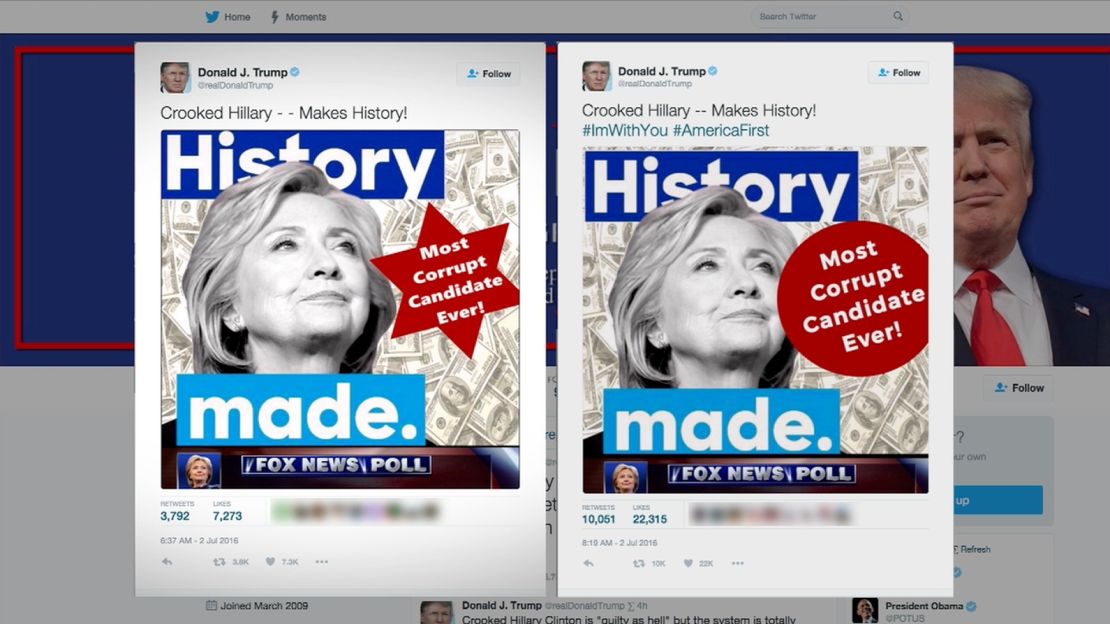Story highlights
Donald Trump tweeted a graphic critical of Hillary Clinton
It featured a six-pointed star over the weekend
Donald Trump set off his latest firestorm this weekend when he tweeted a graphic critical of Hillary Clinton that featured a six-pointed star, a pile of cash and the words “most corrupt candidate ever.”
Critics erupted with complaints that the graphic evoked anti-Semitic imagery and the Trump campaign refused to answer questions about the tweet even as reports emerged that the image had been posted to an anti-Semitic, white supremacist message board 10 days earlier.
Trump downplayed the controversy in a tweet Monday morning by slamming the “dishonest media.”
Related: How Trump overshadowed Clinton’s bad weekend.
On Monday afternoon, the Trump campaign finally issued a statement on the controversy – one that amounted more to a response to the Clinton campaign statement than an explanation of his tweet.
Trump rejected the Clinton campaign’s accusations that his tweet was anti-Semitic by slamming “false attacks” and insisting the star represented a sheriff’s badge.
“These false attacks by Hillary Clinton trying to link the Star of David with a basic star, often used by sheriffs who deal with criminals and criminal behavior, showing an inscription that says ‘Crooked Hillary is the most corrupt candidate ever’ with anti-Semitism is ridiculous,” Trump said in the statement.

Trump’s statement did not address the fact that the campaign tweeted an image that had previously been posted on an anti-Semitic, white supremacist message board. His statement also didn’t explain where the campaign obtained the image.
On Monday night the Trump campaign’s social media director, Daniel Scavino, filled in some details on what he said were the image’s origins.
“The social media graphic used this weekend was not created by the campaign nor was it sourced from an anti-Semitic site,” Scavino said in a statement separate from Trump’s. “It was lifted from an anti-Hillary Twitter user where countless images appear.”
“The sheriff’s badge – which is available under Microsoft’s ‘shapes’ – fit with the theme of corrupt Hillary and that is why I selected it,” Scavino added.
Scavino also said that as the campaign’s social media director, “I would never offend anyone and therefore chose to remove the image.”
On Twitter, Scavino fiercely defended himself against charges of anti-Semitism on Tuesday.
“For the MSM to suggest that I am antisemite is AWFUL. I proudly celebrate holidays w/ my wife’s amazing Jewish family for the past 16 years,” Scavino wrote, using an abbreviation when referencing the mainstream media.
These explanations, though, were rejected by the chairman of the Anti-Defamation League, Jonathan Greenblatt.
“Donald Trump should stop playing the blame game and accept that his campaign tweeted an image with obvious anti-Semitic overtones and that, reportedly, was lifted from a white supremicist website,” Greenblatt said in a statement Monday evening. “It’s long past time for Trump to unequivocally reject the hate-filled extremists orbiting around his campaign and take a stand against anti-Semitism, bigotry, and hate.”
Repeated attempts to ask the Trump campaign for further clarification have gone unanswered, but here are some of the answers to questions the incident has raised:
Why is Trump getting criticized?
The graphic he posted evoked anti-Semitic stereotypes by combining a six-pointed star reminiscent of the Jewish Star of David, a pile of $100 bills and the words “most corrupt candidate ever.”
It wasn’t the six-pointed star alone that evoked anti-Semitism – it’s the combination of the star with a background of money and an accusation of corruption, which suggests stereotypical views of Jews and money and raises conspiracy theories that Jews control political systems.

Or in the words of the ADL’s Greenblatt: “The imagery is the classic trope of Jews and money implying that she’s raising Jewish money, or something along those lines.”
“I get tweeted pictures like this all the time from anti-Semites and racists and white supremacists,” Greenblatt said. “Does this look familiar to me? Absolutely.”
Trump and his supporters have said it wasn’t meant as a Star of David, but a simple six-pointed star or Sheriff’s badge.
It might be, except for the fact that the image wasn’t created by the Trump campaign.
Ten days before Trump tweeted it, the graphic appeared on a message board jam-packed with anti-Semitic conspiracy theories, white supremacist ideology and neo-Nazi propaganda. CNN confirmed the image appeared on the website by using the web archive search tool Wayback Machine.
And a Twitter user, “@Fishbonehead1,” who frequently posted Islamophobic and racist memes, claimed credit for the original image shortly before the account was deleted. The account first tweeted the graphic June 15.
The Trump campaign refused to answer repeated questions over the weekend about where the campaign found the image or whether any of its staffers frequented the fringe message board or other sites that peddle in anti-Semitic and white supremacist views.
How is the Trump campaign defending the tweet?
The campaign deleted the tweet within a few hours, but has yet to acknowledge a mistake or promise any inquiry into the tweet.
“I’m not sure who tweeted this out,” Trump aide Ed Brookover told CNN’s Alisyn Camerota Monday on “New Day.” “We corrected it. There was never any intention of anti-Semitism.”
READ: Trump adviser: Not every six-sided star is a Star of David
“There’s no anti-Semitism in Mr. Trump’s body, not one ounce, not one cell,” Brookover said.
Trump’s recently ousted campaign manager Corey Lewandowski also rejected outrage over the tweet as “political correctness run amok.”
This isn’t the first time the Trump campaign has gotten into trouble over a connection to white supremacists, is it?
No, it’s not.
White supremacists have delivered a groundswell of support for Trump, and the billionaire real estate mogul has taken flack for retweeting tweets from neo-Nazi accounts.
Trump has also been slow to disavow anti-Semitic white supremacists who have expressed staunch support for his candidacy.
Trump initially refused to disavow the support of David Duke, a former Ku Klux Klan grand wizard who continues to promulgate Jewish conspiracy theories, when pressed repeatedly about Duke’s support in an interview by CNN’s Jake Tapper. He would later tweet “I disavow” regarding Duke’s support and blamed his initial refusal on a faulty earpiece.
Duke later tweeted a modified version of Trump’s original graphic on Tuesday, listing Jewish donors to Clinton and writing, “Absolutely true!”
And when pressed on the anti-Semitic vitriol and death threats some of his supporters unleashed online against reporter Julia Ioffe over a profile she wrote about Trump’s wife in GQ magazine, Trump said he didn’t “know anything about that.”
“I don’t have a message to the fans,” Trump said when pressed on the anti-Semitic death threats in an interview with CNN’s Wolf Blitzer in May. “A woman wrote an article that’s inaccurate.”
















